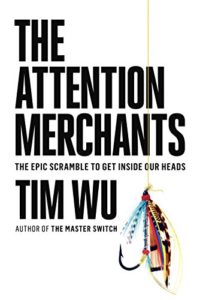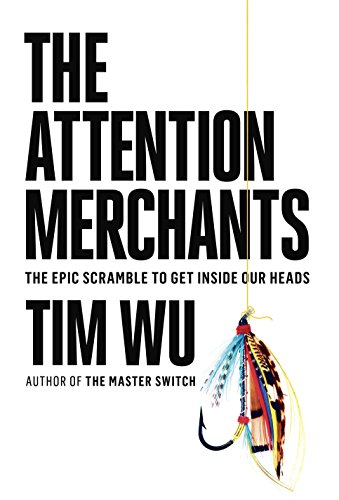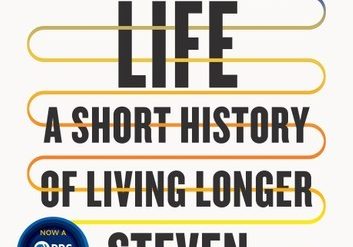
If you’ve been paying attention, you can’t have missed the changes in the character of advertising over the course of your life. Certainly, I have. Chances are, you were born in the age of radio, at the earliest. If so, you’ve witnessed a string of new technologies enter the realm of news and entertainment, almost always paired with aggressive advertising sooner or later: network television, cable TV, the personal computer, the Internet, and the smartphone. And that bane of our attention, pop-up ads.
In his insightful history of the business of advertising, Columbia University law professor Tim Wu casts a wider net. Beginning with the advent of the penny press in the 1830s, he explores in telling detail the now centuries-long battle between the commercial interests who want to seize our attention for their own ends and the individuals who want to keep our lives private and access news, information, and entertainment without distraction. This is a colorful story, and Wu tells it well.
Though Wu opens with the introduction of the Sun in New York in 1833, his history more properly begins much later in the 19th century with the emergence of the advertising industry to sell Snake Oil and other patent medicines. (Yes, Snake Oil Liniment was actually a widely sold product Good for Man and Beast.) “From the 1890s thr0ugh the 1920s,” he writes, “there arose the first means for harvesting attention on a mass scale and directing it for commercial effect . . . [A]dvertising was the conversion engine that, with astonishing efficiency, turned the cash crop of attention into an industrial commodity.”
The Attention Merchants: The Epic Scramble to Get Inside Our Heads by Tim Wu ★★★★★
The penny press, Amos ‘n Andy, and pop-up ads
Beginning in the early years of the 20th century, Wu frames his story around the development of radio and the four “screens” that have dominated our attention over the decades that followed: the “silver” screen (film), television, the personal computer, and the smartphone. The author relates the history of each of these technologies as a human story, describing the often outrageous personalities who pioneered and dominated each of these media in turn. However, in focusing on radio and the four screens, Wu overlooks the billboards that mar every urban line of sight and barely mentions the direct mail that floods our mailboxes. Though less than comprehensive, his historical account is engrossing and enlightening.
Here you’ll learn about the development of propaganda by the British government in World War I and its perfection by Nazi Germany . . . the first radio serial that was a smash hit (the grossly racist “Amos ‘n Andy“) in the 1920s . . . the invention of the soap opera in the 1930s . . . the battle between the networks on radio and later on TV from the 1930s through the 1990s . . . the development of geodemographic targeting for ads in the 1970s . . . the emergence of celebrity culture in the 1980s and its perversion by reality television in the 2000s . . . the wild proliferation of blogging in the 2000s . . . the identity theft committed by Google and Facebook in the 2000s and beyond . . . and, finally, “unplugging” and the emergence of free online streaming services like Netflix in the 2010s. This is not a pretty story.
A harsh judgment
The author is not a fan of the “new media” that have come to hold our attention in recent years. “The idealists had hoped the web would be different,” he notes, “and it certainly was for a time, but over the long term it would become something of a 99-cent store, if not an outright cesspool.” Similarly, Wu’s judgment about the advertising industry is harsh. “[U]nder competition, the race will naturally run to the bottom; attention will almost invariably gravitate to the more garish, lurid, outrageous alternative . . .” It’s difficult to find fault with any of this.
About the author
He’s the man who coined the term “network neutrality.” A specialist in media and technology, Tim Wu has written several books and numerous articles, all nonfiction. His work has influenced the development of national media policy under the Obama Administration.
For related reading
I’ve also reviewed a later book by Tim wu: The Curse of Bigness: Antitrust in the New Gilded Age (It’s time for antitrust: break up big corporations to restore democracy).
Like to read books about business? Check out My 10 favorite books about business history and 10 best books about innovation.
If you enjoy reading nonfiction in general, you might also enjoy:
- Science explained in 10 excellent popular books
- Great biographies I’ve reviewed: my 10 favorites
- Top 10 nonfiction books about politics
And you can always find my most popular reviews, and the most recent ones, on the Home Page.



























